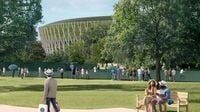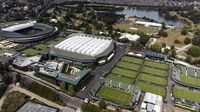Plans to significantly expand the Wimbledon tennis grounds have been given the green light after a High Court judge dismissed a legal challenge brought by a local campaign group. The All England Lawn Tennis Club (AELTC) aims to nearly triple the size of its site by developing the former Wimbledon Park Golf Club in west London, a move that has sparked years of controversy and legal battles.
The proposal, approved by the Greater London Authority (GLA) in 2024, includes the construction of 38 new tennis courts and an 8,000-seat stadium with a retractable roof. This expansion would allow Wimbledon to host its qualifying tournament on-site for the first time, effectively extending the Championships by a week and enhancing the overall event experience.
The campaign group Save Wimbledon Park (SWP) challenged the GLA's decision, arguing that the development was unlawful due to the protected status of the land. Wimbledon Park, a Grade II*-listed heritage site partly designed by the renowned landscape architect Lancelot "Capability" Brown, was previously a golf course that closed in 2021. SWP contended that the land is subject to statutory trusts and restrictive covenants requiring it to remain open for public recreation, and that the GLA's approval disregarded these protections.
SWP's barristers described the decision to approve the plans as "irrational" and urged the High Court to quash the permission, emphasizing the site's historical and environmental significance. They also raised concerns that allowing development on the former golf course would set a "worrying precedent" for the future of protected green belt and metropolitan open land across London and the UK.
However, the High Court judge, Mr Justice Saini, ruled on July 21, 2025, that the GLA's decision was a "planning judgment rationally exercised," taking into account all relevant factors, including the statutory trust and restrictive covenants. In his detailed 31-page judgment, he noted that the authority had "properly considered the implications of the development on public open space."
"In short, the defendant's decision on the relevance of deliverability, applying to both the statutory trust and the restrictive covenants, was a planning judgment rationally exercised and having regard to appropriate and relevant factors," Justice Saini stated.
The ruling means that the All England Club can proceed with its ambitious £200 million project, which not only includes the new courts and stadium but also seven maintenance buildings, new access points, and an area of parkland with permissive public access. The development will incorporate work on Wimbledon Lake and transform nearly 30 acres of the former golf course into publicly accessible green space, a key point emphasized by the club to counter claims of lost open land.
Deborah Jevans, chairwoman of the All England Club, expressed delight at the ruling. "It is clear that we have a robust planning permission that enables us to create a permanent home for the Wimbledon qualifying competition as well as delivering 27 acres of beautiful new parkland for local people, providing public access to land that has been a private golf course for over 100 years," she said.
Jevans also highlighted the extensive community engagement undertaken by the club, noting that more than 10,000 people had attended consultations to understand the plans. "The vast majority of people just want us to get on and deliver the many benefits on offer as soon as possible," she added.
The campaign group Save Wimbledon Park, however, indicated it would seek to challenge the decision further. Christopher Coombe, director of SWP, said the group had been advised to apply for permission to appeal to the Court of Appeal. He warned that the judgment, if upheld, "would set a worrying precedent for the unwanted development of protected green belt and public open spaces around London and across the country." Coombe also expressed hope that the All England Club might engage constructively to resolve the four-year-old dispute.
SWP emphasized that two other significant legal protections remain in place. The All England Club has conceded that the proposed development is incompatible with the statutory public recreation trust said to cover the land. This issue is the subject of separate High Court proceedings scheduled for January 2026. Additionally, the land is subject to restrictive covenants dating back to 1993, which require it to be kept open and free of built development. The club's scheme cannot proceed unless the local authority, Merton Council, releases these covenants.
Residents opposing the expansion have voiced concerns about the loss of green space and the disruption that construction and increased tournament activity would bring over the next decade. They argue that the land, classified as metropolitan open land with protections akin to green belt or royal parks, should remain preserved for public use.
On the other side, the All England Club contends that the transformation of the former private golf course into publicly accessible parkland will benefit the community. The club also stresses that scaling up facilities is essential to maintain the prestige and future viability of the Wimbledon Championships, one of tennis's four Grand Slam tournaments.
The legal dispute traces back to 1993 when the All England Club purchased the freehold of the golf course from Merton Council for £5.2 million and agreed to restrictive covenants limiting the land's use to leisure and recreation. The leasehold was acquired in 2021, consolidating the club's control over the site.
Mayor of London Sir Sadiq Khan welcomed the High Court's ruling, calling it "welcome news that will cement Wimbledon’s reputation as the greatest tennis competition in the world and London as the sporting capital of the world." Khan highlighted the broad benefits the project would bring, including economic, social, cultural, and environmental advantages such as job creation and new green spaces.
Jules Pipe, London’s deputy mayor for planning who granted the original planning permission after the mayor recused himself due to prior public support for the development, described the proposals as facilitating "very significant benefits" that "clearly outweigh the harm."
The project has also attracted support from prominent figures in the tennis world. Novak Djokovic, a seven-time Wimbledon champion, called the expansion a “win-win” for the sport, while Olympic sailing champion Sir Ben Ainslie, a local resident, expressed enthusiasm for the plans, including the transformation of the sailing club on Wimbledon Lake.
Despite the legal setback, SWP's campaign continues, with the group committed to fighting for the protection of Wimbledon Park's green space and public access rights. The upcoming January 2026 hearing regarding the statutory trust and ongoing negotiations over the restrictive covenants promise that the dispute is far from over.
For now, however, the All England Club is poised to move forward with a landmark expansion that promises to reshape the Wimbledon Championships and the surrounding community for years to come.


